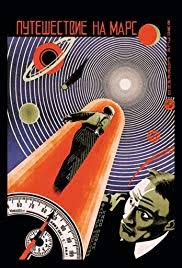
“Love is the force you call God.”
Captain Avanti Planetaros (Gunnar Tolnaes) has returned from naval service to his home after many adventures to his father Professor Planetaros (Nicolai Neiiendam) and his sister Corona (Zanny Petersen). Looking for new horizons his father, an astronomer, tells him that there are adventures in space that no one has experienced.
This instills in the young Avanti a desire to travel in space and find the adventure he seeks. He learns how to fly aircraft and is exhilarated by the experience of flying higher than anyone else. Further fueled by his euphoria he asks his friend, and sister’s boyfriend, Dr. Kraft (Alf Blutecher) to construct a ship that would take him to Mars.
Two years later the ship, called the Excelsior, is completed. Avanti has a meeting of prominent astronomers looking for brave young men that want to join him on his expedition to Mars. Professor Dubius (Frederik Jacobsen) mocks the project and the young Avanti. Despite Dubius’ words, Avanti puts together a crew that includes his friend Dr. Kraft. The ship and crew take off at a time that will bring them to Mars when it is the closest to Earth in its orbit. After many months on the ship some of the crew begins to get restless and mutiny is in the air. The ringleader of the mutiny is an American, David Dane (Svend Kornbeck).
Just before the crew takes over the ship they reach Mars and are met by the Martian Leader (Philip Bech). On Mars Avanti and his crew find an advanced civilization that has done away with war and killing and lives in peace and harmony. Avanti falls in love with the daughter of the Martian Leader, Marya (Lilly Jacobson).
Back on Earth Avanti’s father and sister are worried about Avanti and Kraft. It has been many months since they left and there is no way to know if they are still alive. Kraft goes to the Martians and asks them if there is a way they can send a signal to Earth to let their loved ones know they are alright. On Earth seven bright lights are seen through the telescope by Corona. She calls her father to the telescope to show him. The seven lights, he says outline the constellation Corona. His daughter’s name. It is proof that they are still alive.
“A Trip To Mars” was released in 1918 and was directed by Holger-Madsen. It is a full length Danish silent movie. Not only is it a science fiction story but it is also an enchanting fairy tale with a moral. The film’s production values are quite extensive for a silent film of this era.
In Sophus Michaelis’s 1918 novel and screenplay, modern social problems are expressed in a science fiction/fantasy format. Mars is portrayed as a Utopian society. Many science fiction authors seem to believe that Utopia is just out of reach or is something that could be attainable if mankind was advanced enough. In this story Mars’ civilization is more advanced and has attained that Utopian society. No longer worried about wars they pursue peaceful endeavors.
Mars attained this Utopia by reverting to a simpler time. The industrial revolution brought better ways to destroy and kill. To advance civilization one must go back to a time when there was no need for war. Easier said than done and very naïve since we are still talking about mankind here. There have been wars since cavemen invented throwing rocks. H.G. Wells felt that Utopia was something attainable in the future on Earth as did many Star Trek episodes.
One cannot blame Michaelis for wishing for a better way of life since the novel and movie were made during WWI. This was a time when advances in military technologies brought about such carnage that the world had not seen before. At least sixteen million people died during that war, both civilian and military. A little Utopia would have been nice.

